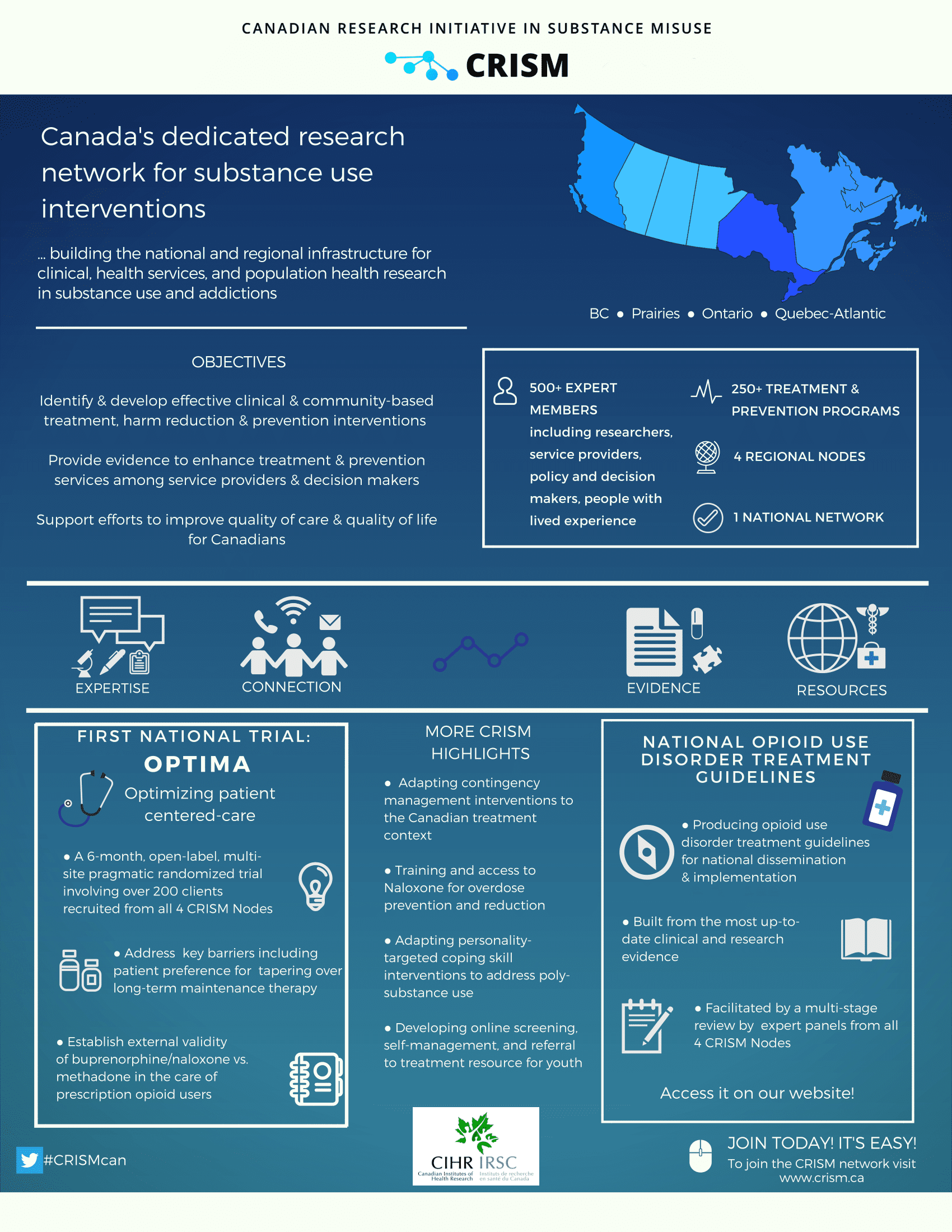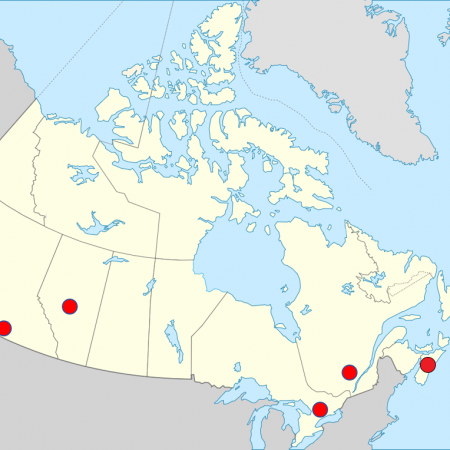About CRISM
Addiction research in Canada suffers from geographic isolation of research groups as well as limited communication between service providers and academic research teams. This has hindered intervention research and translation and incorporation of evidence into prevention and treatment programs. To address these gaps, the Canadian Institutes of Health Research (CIHR), through its Institute for Neurosciences, Mental Health, and Addiction (INMHA), has developed the Canadian Research Initiative in Substance Matters (CRISM).
CRISM is a 5-year initiative and was modeled, in part on the US National Institute on Drug Abuse’s Clinical Trials Network.
CRISM was designed to facilitate communication and collaboration among addiction service providers, researchers, and policy-makers. In September 2015, four regional CRISM Nodes began operations, one each located in BC, the Prairies, Ontario, and Québec/Atlantic. In 2022 a separate node was added in the Atlantic region and CRISM was renewed for an additional 6 year term.
In order to address our objectives, we have formed a Prairie CRISM Node to link together individuals in Alberta, Saskatchewan and Manitoba who are interested in working toward accomplishing these goals.
Our infographic provides a quick overview of current CRISM activities.

Links to CRISM network and node reports can be found here.
Link to CRISM Prairie Node CIHR applications can be found here

National Objectives
- Identify and/or develop the most appropriate clinical and community-based interventions for problematic substance use/addiction, including at the level of:
- prevention
- harm reduction
- specialty-based addiction treatment
- Provide evidence to support the enhancement of prevention and treatment services regarding problematic substance use/addiction to decision makers and service providers;
- Support improvement in the quality of care and quality of life for Canadians living with problematic substance use/addiction.

About the CRISM Prairie Node
Alberta, Saskatchewan, and Manitoba have excellent researchers investigating substance misuse/addiction interventions (including prevention, harm reduction and specialty-based addiction treatment) delivered in the clinic, the community, and in academic research settings. Each Province funds treatment and prevention of substance misuse/addiction and has developed strategic plans through their respective Ministries of Health and Regional Health Authorities. But to date, these assets have operated either in isolation, or as part of small provincial teams.
The CRISM Prairie Node has over 400 members, including investigators, system and program managers, policy makers, and consumer advocates, each of whom recognizes the need for enhanced regional collaboration to address substance misuse/addiction, and who have committed to participate in a Prairie regional CRISM Node.
How will CRISM Prairies contribute to health and wellness in Canada?
Learn more on the CRISM Prairies YouTube Channel or select a video link below:
CRISM Prairies PI Cam Wild (5:47)
CRISM Prairies PI Colleen Dell (5:41)
The Prairie Node’s 3 Challenges
- Treatment and prevention services that serve a diverse case mix of substance misuse/addiciton clients drawn from urban and rural populations – the latter who are often highly geographically dispersed;
- High prevalence of substance misuse/addiction among Indigenous peoples, the fastest-growing segment of urban populations in this Canadian region;
- Relatively limited research capacity (i.e., few faculty positions and trainees specifically allocated to substance misuse/addiction; limited in-house capacity for substance misuse/addiction research among service providers).

The Prairie Node’s Objectives
- Create effective and trusting collaborative working relationships among our members, and
- Develop accessible resources for substance misuse/addiction interventions that are of value to researchers, service providers, and consumer advocates.
Long-term Goals
- Facilitate regional uptake of evidence-based treatment and prevention interventions for substance misuse/addiction, including polydrug misuse and related comorbidities;
- Increase regional capacity to test the efficacy and effectiveness of new treatment and prevention interventions; and
- Effectively collaborate with other CRISM Nodes and other research partners on intervention trials, secondary analyses, and related research.
The Prairie Node Team
-
 David Hodgins, Karen Turner, Sheri Fandry, Cam Wild, Colleen Dell Node Steering Committee
David Hodgins, Karen Turner, Sheri Fandry, Cam Wild, Colleen Dell Node Steering Committee -
 Denise Adams Research Manager
Denise Adams Research Manager


